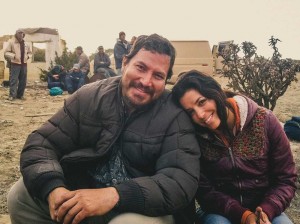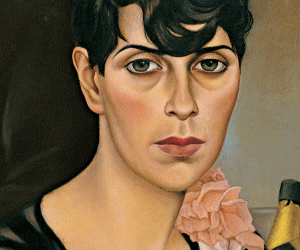Some character actors, regardless of their ethnicity, are content to specialize in a particular type of role. Danny Trejo’s resumé is filled with the roles of convicts and other menacing types, while John Leguizamo tends to play smooth-talking operators. That doesn’t describe Cedillo.
Instead, this broad-shouldered actor with distinguished, chiseled features is a chameleon-like presence who makes a virtue of versatility and his fluency in both English and Spanish. The innocence of his cowboy in Melquiades Estrada contrasts with the less scrupulous vaquero he played in Cowboys & Aliens, and both those rough characters are quite different from the polished types he played in The Walking Dead (an Air Force pilot) and Drop Dead Diva (a prosecutor).

Hairstyles and accents help him alter his appearance, as do physical embellishments. To play an ex-con in the 2009 thriller In the Electric Mist, Cedillo asked his brother, a homicide detective, about the dumbest tattoo he’d ever seen on a criminal and then promptly got a fake tattoo on his neck of the 210 area code.
Preparation is also critical. Acting in TV shows means watching previous episodes of the show as well as getting to know his character. For his role as the prosecutor on Drop Dead Diva, he paid close attention to the tone of his voice, which needed to be intimidating.
For Frontera, he delved deep into the character’s background. “I had to understand what part of Mexico he was going to be in,” Cedillo said. “Northern Mexico is completely different from Southern Mexico. What kind of human smuggler was he? Was he part of a drug cartel? … The simpler the questions, the more profound the results will be.”
He does worry about being stereotyped as a Latino actor, especially when he plays drug dealers or other unsavory types. “I don’t necessarily want to be playing nefarious characters always, but I’m never going to say no because those are real people,” he said. “The middlemen [in the drug trade] are just trying to feed their families. Let’s see that. TV and movies compartmentalize it and almost glorify it. My job is to try to bring some humanity to that so it’s rooted in something.”
Though he is willing to take on villainous parts, he won’t take a role “where I’m just a stereotype and I can’t do anything.” He noted that while pay is a factor in his choice of roles, “Not everything’s about money.”
Whatever the role, he does his best to ensure that the Spanish he speaks is appropriate to the setting. Scripts often aren’t written by native Spanish speakers, and even when they are, there are as many dialects and accents in that language as there are in English.
While working on Frontera, he changed a reference to the chupacabra (“that’s a pop-culture myth”) to one about Cucuy, the Spanish-language equivalent of the boogeyman. It’s not easy telling a writer that the language in the script isn’t quite right. He admitted that his own Spanish isn’t always perfect — his Mexican Spanish was probably out of place in the role of the Panamanian general he played on TV’s Prison Break. Still, it’s important to get it right as much as possible, he said.
The realities of Hollywood are nothing like what Cedillo imagined growing up.
“I thought that once I got there, we’d all fly away and be friends and make movies together,” he said. “The reality is, we’re all gypsies. We come together for the work. There’s a very small top [of the pyramid] that everyone is trying to get to, and for the people who get there, it’s all just a lot of work and a lot of pressure.”
Still, Cedillo has stories to tell, like the one about how Wes Anderson’s inexperience as a filmmaker showed on the set of the acclaimed director’s 1996 debut film Bottle Rocket (in which Cedillo played “Man Outside Bar”) or Christopher Walken’s habit of rearranging the punctuation in scripts to help with his delivery.
One of the stars he has worked most closely with is Tommy Lee Jones — though not exactly voluntarily. He got to know Jones through the 2006 Western The Three Burials of Melquiades Estrada, an award-winning film that was a turning point in Cedillo’s career.
He drove to Austin in 2004 to read for the part of Melquiades, a simple vaquero on the border, after a casting director named Joe Bollin had recommended him. When Cedillo finished the reading, Jones’ reaction was immediate.
“Tommy said, ‘It’s impressive when you see the character step off the page. It’s only happened twice, and you’re the second time,’ ” Cedillo recalled.
Then Jones asked if he had experience riding a horse. Cedillo didn’t.
Despite the positive comments, Cedillo tried not to expect anything. The idea that he’d get to star alongside Jones, Barry Pepper, January Jones, and others felt too good to be true. He got back in his car, drove three hours back to Fort Worth, and fell asleep, exhausted.
He only got to rest for a couple of hours, however. “My wife wakes me up and says, ‘You have a call from your agency.’ They don’t call for anything [unimportant]. I was the only actor they saw in Texas. Once Tommy saw me, he didn’t want to see anyone else.”
Soon after, Jones called him directly, but not to offer congratulations. Jones told Cedillo he should come to his ranch near Van Horn to prepare for the role. But there was a catch.
“I’ve never been paid to prepare for a role, so I’m not going to pay you to prepare for the role, but it behooves you to come work with some of the best cowboys and horses in the country,” he recalled Jones saying.
So Cedillo spent the next several weeks working as Jones’ unpaid ranch hand, repairing fences and digging ditches. Cedillo now sees that “preparation” as more of a mind game Jones played on him.
“It was daunting, but I was in the world of Tommy Lee Jones,” he said, meaning he was isolated with only Jones’ family and entourage around.
“Now, after 10 years, I can say that I didn’t need all that,” Cedillo reflected.
The film would debut at Cannes Film Festival and win prizes for Best Actor (Jones) and Best Script (Guillermo Arriaga). And at Cannes, Cedillo would get to see another side of Jones and of the film industry.
********











